Alexander Kazbegi


Alexander Kazbegi (Georgian: ალექსანდრე ყაზბეგი, Aleksandre Kazbegi) (1848–1893) was a Georgian writer, famous for his 1883 novel The Patricide.
Kazbegi was the great grandson of Kazibek Chopikashvili, a local feudal magnate who was in charge of collecting tolls on the Georgian Military Highway. Alexander Kazbegi studied in Tblisi, Saint Petersburg and Moscow, but on returning home, decided to become a shepherd to experience the lives of the local people. He later worked as a journalist, and then became a novelist and playwright. In his later life, he suffered from insanity. After his death in Tbilisi, his coffin was carried across the Jvari Pass to his hometown of Kazbegi (now renamed Stepantsminda), which also preserves his childhood home as a museum in his honor.
His most famous work, the novel The Patricide is about a heroic Caucasian bandit named Koba, who, much like Robin Hood, is a defender of the poor. Koba has nothing but contempt for authority, a proclivity towards violence, and a firm belief in vengeance. Kazbegi's work was a major inspiration to Iosif Jughashvili, later known as Joseph Stalin, who used Koba as a revolutionary pseudonym.
References
- Bullock, Allen. Hitler and Stalin:Parallel Lives. Vintage Books. 1993. ISBN 0-679-72994-1
- Rosen, Roger. Georgia: A Sovereign Country of the Caucasus. Odyssey Publications: Hong Kong, 1999. ISBN 962-217-748-4
| Wikimedia Commons has media related to Alexander Kazbegi. |